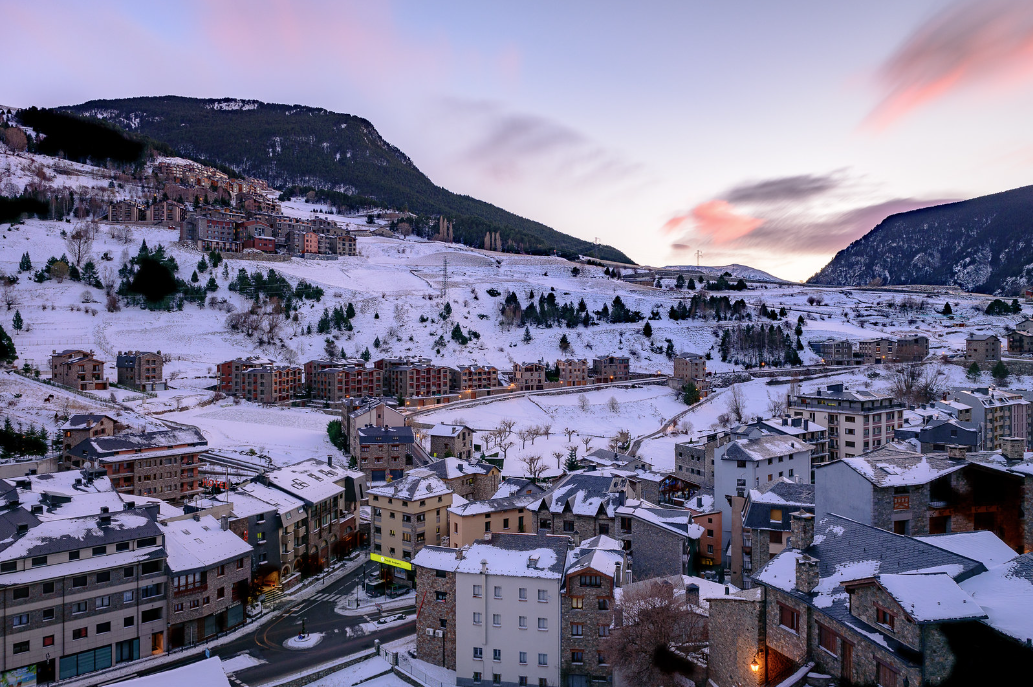
Andorra is a small country located in the Pyrenees, between Spain and France. This small European principality stands out for its quality of life, security and low taxes, which makes more and more people consider living in Andorra.
It is an attractive option due to its tax advantages, natural environment and cultural diversity, which enriches daily life and attracts people from all over the world. Although the cost of living can be high, many people find Andorra an attractive place to call home. But what does it take to live in Andorra? This is a guide to the residency requirements and rules for living in Andorra.
Requirements to be a tax resident in Andorra
There are some general conditions that anyone wishing to live in Andorra must fulfil, regardless of the type of residence:
- Be of legal age
- Not have a criminal record
- Have accommodation in the country (rental contract or title deed)
- Residence in the Principality of Andorra for a minimum period of time
- Pay a deposit of between 15,000 and 50,000 euros.
- Undergo a medical examination
To accredit these requirements, you must have a criminal record certificate from your country of origin, a valid passport, a certificate of civil status, a document accrediting the payment of the deposit to the Government of Andorra, original documents of the contract of sale of the property or rental contract and documents relating to insurance for disability, illness or retirement.
Types of residency in Andorra
Depending on the type of residency, you will have to comply with a series of specific conditions to live legally in Andorra.
Active residency on your own account
This type of residency is the most common among entrepreneurs. To access it, you need to have a university or professional academic degree, create a company or register as self-employed, as well as pay a deposit of 50,000 euros and pay taxes to the Andorran social security system. After residing in the country for 183 days or more, you get tax residency.
In addition, you will need a CV with relevant information about your education and experience, you will have to submit the application for immigration authorisation for self-employed active residents and have obtained the foreign investment authorisation.
You must also have a shareholding of more than 34% of the total share capital, hold a position in the company's administration and prove that the company has a duly registered and active business for a maximum of three months.
Active residence as an employed person
Depending on the type of contract, the permit may be temporary or indefinite, the time of the permit being restricted to the time of the employment contract. The minimum period of residence is also 183 days. The requirements on this occasion are:
- Employment contract from the Andorran company where you are going to work
- CV with relevant information about your education and experience
- Proof of education, qualifications and work experience
- Filling in and signing a sworn statement of the training plan
- Registration with the Comú
- Submit the application for immigration authorisation for employed active residents
Passive residence without gainful activity
Passive residence in Andorra is an option for those who want to live in the country without working. This modality requires a high investment and it is only necessary to reside effectively for more than 90 days a year. For this reason, it is usually chosen by retirees, senior executives, retired sportsmen and women or people with large fortunes.
In the case of not having any type of lucrative activity, i.e. being retired, it is necessary to have sufficient annual income to live in the country (400% of the Andorran minimum wage) and to invest at least 600,000 euros in Andorran assets.
This form has the advantage that the main holder can bring their family members as residents on the same permit, provided they are dependent on them. These family members only have to present the basic documentation (as they are living under the responsibility of the holder) and pay an additional 9,500 euros as a deposit to the Andorran Financial Authority (AFA) for each member.
In addition, as there is no economic activity in the Principality of Andorra, there is no social security to pay. However, if it is not paid, it is compulsory to have insurance and coverage for illness, disability and old age valid for Andorra, both for the applicant and for his/her dependants for the duration of the coverage. There are only two exceptions: minors and people over 60 years of age are only required to have insurance and sickness cover.

Passive residence for professionals with international projection
This is one of the tax residency modalities in Andorra that does not require any work or professional activity in the country. It is aimed at people who provide services from Andorra to clients or companies located abroad, provided that at least 85% of the income comes from these services. The requirements to apply for this type of residence are as follows:
- Residence in Andorra for at least 90 days per calendar year.
- Have a recognised and accredited higher academic or professional qualification.
- Proof of the provision of services from Andorra to entities or persons located outside Andorran territory by means of contracts, invoices or other documents.
- Invest a minimum of 600,000 euros in Andorran assets, of which at least 50,000 euros must be deposited in the AFA and the rest can be real estate, shares, financial products or Andorran public debt.
- To have a private medical insurance with health coverage in Andorra for the applicant and his/her dependants.
- Present a medical certificate issued in Andorra certifying the good state of health of the applicant and his/her dependants.
- Present a criminal record certificate from the country of origin and from the countries where he/she has resided for the last 10 years.
- Proof of financial sufficiency to cover the needs of the applicant and dependents, which is established at a minimum of 300% of the Andorran minimum wage for the applicant and an additional 100% for each dependent family member.
Passive residence for cultural, scientific or sporting interest.
This is a type of tax residence that does not require any work or professional activity in the country, but is aimed at people who stand out in any of these areas and who carry out their activity from Andorra at an international level.
If you wish to access it, the requirements are the same as those requested in the previous type of passive residence, with the addition of due accreditation of cultural, scientific or sporting interest by means of certificates, awards, recognitions or publications that endorse your career.
How to start the process to live in Andorra
To begin the procedure to live in Andorra, you must first decide what type of residence you want to apply for. In addition, you will have to fulfil the requirements according to the type of residence you select, as well as the general conditions.
To start the procedure to live in Andorra, you must fill in and submit the immigration authorisation application corresponding to the type of residence you wish to obtain, together with the required documentation.
You can do this in person or through a legal representative. The procedure is carried out at the Immigration Service of the Ministry of Foreign Affairs of the Principality of Andorra. The deadline for resolving the application is three months from its submission.
Taxes when living in Andorra
Taxes in Andorra are among the lowest and most attractive in Europe, which makes the country an ideal destination for many residents and investors. The main taxes paid in Andorra are:
- Personal Income Tax (IRPF), which is levied on income earned by tax residents in Andorra. The maximum rate is 10%, but there is a minimum exemption of 24,000 euros and a 50% rebate for income between 24,000 and 40,000 euros. Non-residents are only taxed on income obtained in Andorra, at a rate of 10%.
- Corporate Income Tax (IS), which is levied on the profits of companies and legal entities domiciled in Andorra. The general rate is 10%, but can be reduced to 2% for activities of national interest or 0% for holding companies. There are also exemptions to avoid double taxation and special regimes for new companies.
- General Indirect Tax (IGI), which is the equivalent of VAT in other countries. It is a consumption tax levied on the sale of goods and services in Andorra. The general rate is 4.5%, but there are other reduced rates of 0%, 1%, 2.5% and 9.5% depending on the product or service taxed.
- Real Estate Capital Gains Tax, which is levied on the increase in value obtained from the transfer of real estate located in Andorra. The rate varies according to the length of time the property has been owned, e.g. 15% if sold within one year.